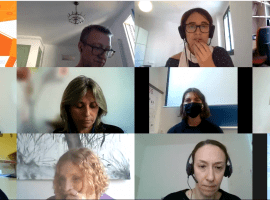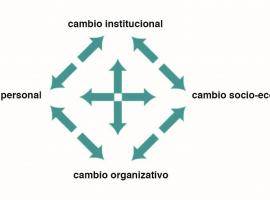Although the process of setting up the tenants’ cooperative Bloc Cooperatiu went as fast as one could have possibly imagined, the transition to the afterlife of the EU-funded project has still unknown parameters. With the experience gained from the 'Yes, we rent! project and the new framework conditions (no further funding from UIA), Mataro’s model needs to be adapted and further developed. This is particularly the case in the following areas:
· Stabilisation of Bloc Cooperatiu through a sustainable business model, which allows its long-term financial viability, and the enhancement of its capacities and capabilities to run and manage the cooperative in its operation.
· Acquisition of further flats by Bloc Cooperatiu to increase the offer of affordable housing and at the same time strengthen their financial basis to be able to permanently pay staff.
· Bonding of the current owners with their flats to the cooperative so that they let their flats to the cooperative over the agreed 5-year period.
· Consolidating the cooperation between the municipality and Bloc Cooperatiu, to further advance the public-cooperative partnership to the benefit of both sides.
Stabilisation of Bloc Cooperatiu
First and foremost, it needs an official agreement between Bloc Coopertiu and the city council of Mataró that ratifies the transfer of the acquired flats during the ‘Yes, we rent!’ project to the management of Bloc Cooperatiu, setting out the rights and duties. As the viability report states that Bloc Cooperatiu needs to attract at least 18 additional flats every year to be able to pay for a stable staff of 1,5 persons for managing the cooperative, they need to build up its capacities to mobilise new flats to make the affordable housing scheme sustainable. With the increase in the number of managed flats, Bloc Cooperatiu needs as well to increase its capacities and skills in the management of the affordable housing stock and its relationship with the owners and between owners and tenants in a way that is appreciated by all sides.
All this includes taking decisions about which services related to the management of the affordable housing stock can continuously be provided by the cooperative (one could think of mobilizing new flats for the cooperative, housing mediation) and which are better left to external partners, as they may demand know-how that is difficult to build up over a few years (e.g. conducting renovation works to bring the newly mobilized flats up to standard).
It also needs – at least at the moment – ongoing support from the municipality or networks of social and cooperative housing providers. In further building up relationships with the relevant networks and federations of the social, affordable and cooperative housing sector, Bloc Cooperatiu will be able to tap deeper into knowledge exchange on the management of cooperative housing.
To strengthen the economic basis of Bloc Cooperatiu to provide affordable housing and to become financially sustainable, they might need to diversify its housing stock into different segments, which “cross-subsidise” each other, e.g. through public subsidies for the provision of social housing, or by renting out a part of the flats at market prices. This strategy can go beyond the sector of privately owned flats and be supported by the joint purchase of housing between the city and the cooperative.
A greater diversity of housing types and target groups could also be a good strategy. This is well elaborated in the document about Economic and institutional sustainability.
Acquisition of further flats
Efforts to mobilise further flats will remain futile. One approach to mobilise further flats could be to not only focus on vacant flats in Mataró, but also to attract flats for which a change of tenant is upcoming or for which the flat is to be rented for the first time. It can be assumed that the renovation costs for these flats will be lower. In this case, it might be possible for the cooperative to finance these costs. In return, the rental income would be available to the cooperative until the renovation costs, including a service fee, are paid. This way, the owners would not have to go into debt or take out loans. In order for the cooperative to be able to pre-finance these costs, either the municipality could provide an interest-free loan or act as a guarantor with banks.
For the acquisition of flats, so far the economic incentives have been important for owners. Given that the economic incentives provided during the EU-funded pilot phase cannot be maintained in the long term, Bloc Cooperatiu needs to engage with the sorts of property owners who prioritize objectives such as peace of mind in the management of their property or social values (such as making a contribution to the local community) over maximizing their financial gain. It seems therefore plausible not to try to convince the most profit-oriented owners on the local market with financial subsidies, but instead focus to gain the long-term loyalty of owners with a less developed profit-maximising logic. This means the cooperative should focus its communication and outreach efforts on those owners who are most likely to remain loyal to the initiative rather than trying to reach all owners of empty flats. One member of the project’s advisory council called this “focusing on low-hanging fruits”. They need to highlight the cooperative’s social objectives and community benefit in a real branding effort towards the local citizens.
In order to fully tap into the potential of those owner-types, Bloc Cooperatiu needs to also ensure that is can provide the worry-free and professional management that for these groups is of particular importance. The big equation of the project is: is the added value offered by the cooperative worth the reduction of the rent income?
Albert Terrones, Housing Manager, Mataró City Council
Bonding of the current owners
At the moment, the affordable rents can only be assured for 5 years as the contracts to let the flats to the ‘Yes, We Rent!’ housing system run out after these five years. Thus, the long-term positive impact on housing affordability depends largely on the capacity of Bloc Cooperatiu to convince owners to stay with the affordable housing scheme that Bloc Cooperatiu is managing. Thus, they need to strengthen its relationship with the owners to bond them to the cooperative and its housing scheme.
As mentioned above, non-monetary benefits can also contribute to bonding with the cooperative, e.g. identification with the goals and values of the cooperative, or landlords could be involved in social and community activities and services of the cooperative. Key is also that the cooperative keeps its “promises” especially with regard to regular rent payments and responsible tenants who handle the flat with care and do not cause problems with other tenants. For many owners it is important to burden themselves as little as possible with the flat and the tenants. For this the cooperative needs to develop a good reputation on the rental market. Another incentive could be that flats can also be rented up to the average market rent, but then to more fair conditions e.g. a rental deposit of one instead of three months.
I think that the key for owners to continue in the programme is the experience that they will have had in the first 5 years with Bloc Cooperatiu. If Bloc Cooperatiu can demonstrate that their management is good, fast and efficient, this will inspire confidence to owners to keep their flat within the programme, because they don’t have problems, they receive their income every month and they feel secure.
Eduardo González de Molina Soler, Housing researcher, UPF Barcelona
Consolidating the cooperation between the municipality and Bloc Cooperatiu
To strengthen and further advance the public-cooperative partnership for the provision of affordable housing, the municipality and Bloc Cooperatiu need to define a legal and practical framework for their future cooperation to secure and further develop the achievements of ‘Yes, we rent!’. This needs to be accomplished with the intention to bring together the capacities and capabilities of both institutions in the provision of affordable housing in Mataró. The cooperative could help putting the municipal housing policy on a broader base, inject citizen social capital and collective efforts and bypass some bureaucratic constraints the city council has to face. On the other side, the municipality could bring the cooperative housing to a new level by acting as legal guarantors, facilitating access to finance and buildings and providing technical support.
For example, the financial support of Bloc Cooperatiu by the city council could be continued but scaled down to a form of support in access to credit or reductions of housing taxes, or where the municipality could take out insurance for loss of rent for the cooperative, which would cost comparatively little to the municipality. Further support, in particular in acquiring more flats is needed, as with the official closing of the project, the cooperative was not given 220 flats to manage, as originally planned, but in fact only 59. This means that the economic basis for an independent operation is missing.
With regards to the long-term establishment of the cooperative, it should be considered whether the cooperative can be put in a position to buy flats or whether the municipality buys up flats that are rented through the cooperative. Such and other forms of cooperation between the municipality and the cooperative need to be investigated to continue with the mobilisation of private empty flats for the affordable rental housing market in Mataró.



























